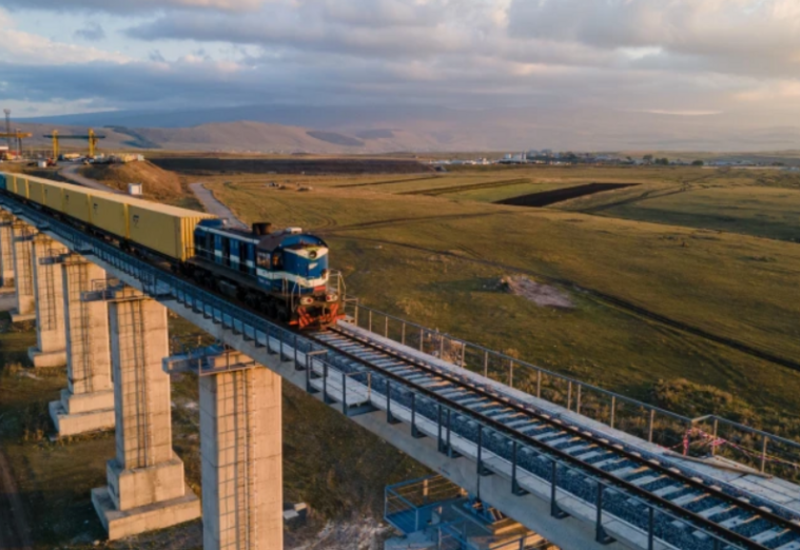|
|
TODAY.AZ / Politics
Trans-Caspian Transport Corridor emerges as new opportunity for Azerbaijan, Tajikistan relations
23 May 2024 [16:45] - TODAY.AZ

Bilateral relations between Azerbaijan and Tajikistan span more than thirty years. Azerbaijan established diplomatic relations with the Republic of Tajikistan for the first time on May 29, 1992, in the second year of its independence.
In addition, there are a number of common values that unite Azerbaijan and Tajikistan. Azerbaijan can be considered important due to the geostrategic importance of Tajikistan, which is a Central Asian state.
The Treaty of Friendship and Cooperation between the Republic of Azerbaijan and the Republic of Tajikistan was signed on March 15, 2007, in parallel with the opening of the Embassy of Azerbaijan in the Tajikistan Republic. Certainly, this great event played an exceptional role in strengthening mutual cooperation between the two countries. The mutual visits of the two heads of state resulted in important events in the steps taken forward.
The meeting of Tajikistan President Emomali Rahmon, who is currently on a state visit to Azerbaijan, with President Ilham Aliyev in Baku was marked by the signing of 14 important documents. President Ilham Aliyev emphasised this in his expanded meeting with the President of Tajikistan and noted that the Declaration of Strategic Partnership signed between the two countries is one of the important stages in the development of relations.
Azerbaijan considers it important to develop mutual cooperation in relations with Tajikistan, not only in one field, but also in the fields of transport and logistics. During the meeting, President Ilham Aliyev drew attention to this issue and emphasised the strategic importance of the Trans-Caspian transport corridor.
“Of course, one of the topics we discussed today is cooperation in the transport sector, taking into account the new opportunities of the transport and logistical infrastructure of Tajikistan and Azerbaijan. I think it will be useful to join our efforts in this direction and coordinate our steps more closely. The Trans-Caspian transport corridor is becoming increasingly popular in the European and Central Asian regions. Azerbaijan, as a connecting link and a country located at the junction of Europe and Asia, of course, plays an important role in this issue with its transportation infrastructure,” President Ilham Aliyev said in his expanded meeting with his Tajik counterpart.
During the negotiations, the President of Tajikistan emphasised that special attention was paid to the agricultural sector. In addition, Emomali Rahmon said that he appreciated the signing of the Road Map on the development of cooperation in the field of tourism and noted that the relevant institutions of Tajikistan have been instructed to take measures to restore direct flights between Baku and Dushanbe.
At the same time, the President of Tajikistan once again said that special attention is paid to the fields of transport and communication during the press statement event with his Azerbaijani counterpart. He said that he is grateful to the Azerbaijani side for providing acceptable transit rates to the freight carriers of Tajikistan.
Thus, from the meeting of the presidents of Azerbaijan and Tajikistan, it is once again clear that Azerbaijan is the most reliable partner, friend, and strategic country not only for Europe but also for Central Asian states. During the negotiations between the presidents, the impressions expressed by the President of Tajikistan, Emomali Rahmon, about Azerbaijan were remembered with special importance. He addressed to his Azerbaijani counterpart, President Ilham Aliyev, a famous phrase used by leaders of Western countries about Azerbaijan: "Azerbaijan is a reliable friend and partner for Tajikistan. Our countries have time-tested relations."
Azerbaijan’s political and economic strategies have always been based on reliability and sincerity in friendship and cooperation with all countries. This has always been done in a balanced way, not only with the Eastern allies but also with the Western allies. Today, the important steps taken by Azerbaijan in the direction of the security of the South Caucasus serve to ensure a long-term partnership with Western and Eastern countries.
URL: http://www.today.az/news/politics/248713.html
 Print version
Print version
Connect with us. Get latest news and updates.
See Also
- 05 February 2026 [14:46]
Armenian citizen Madat Babayan sentenced to 19 years over Khojaly genocide - 05 February 2026 [14:14]
India has failed Iran and Armenia - competition with the Middle Corridor will not take place - 05 February 2026 [11:11]
Azerbaijan and Armenia in Abu Dhabi - how one leader changed world - 05 February 2026 [10:25]
Footage of Zayed Award for Human Fraternity ceremony posted on President Ilham Aliyev's social media accounts - 04 February 2026 [13:13]
Armenian emblem with two heads - 04 February 2026 [11:11]
Azerbaijan, Armenia and Masdar - 04 February 2026 [09:33]
President Ilham Aliyev held expanded meeting with Armenian Prime Minister in Abu Dhabi - 03 February 2026 [14:14]
Rumors about the Catholicos’ arrest are circulating in Armenia once again, raising the question of their purpose - 03 February 2026 [12:12]
Zangezur corridor become part of TEN-T: European Union is joining fight for South Caucasus - 03 February 2026 [10:28]
President Ilham Aliyev meets with Secretary General of Muslim Council of Elders in Abu Dhabi
Most Popular
 Zangezur corridor become part of TEN-T: European Union is joining fight for South Caucasus
Zangezur corridor become part of TEN-T: European Union is joining fight for South Caucasus
 Norwegian parliament to debate abolishing monarchy over 'Epstein' crisis
Norwegian parliament to debate abolishing monarchy over 'Epstein' crisis
 bp commemorates Magsud Ibrahimbayov’s birth anniversary
bp commemorates Magsud Ibrahimbayov’s birth anniversary
 Azerbaijan, Armenia and Masdar
Azerbaijan, Armenia and Masdar
 Rumors about the Catholicos’ arrest are circulating in Armenia once again, raising the question of their purpose
Rumors about the Catholicos’ arrest are circulating in Armenia once again, raising the question of their purpose
 Israeli tourism to Azerbaijan soars, prompting flight expansion
Israeli tourism to Azerbaijan soars, prompting flight expansion
 Iran charges state TV staff after mockery of protest victims sparks outrage
Iran charges state TV staff after mockery of protest victims sparks outrage
